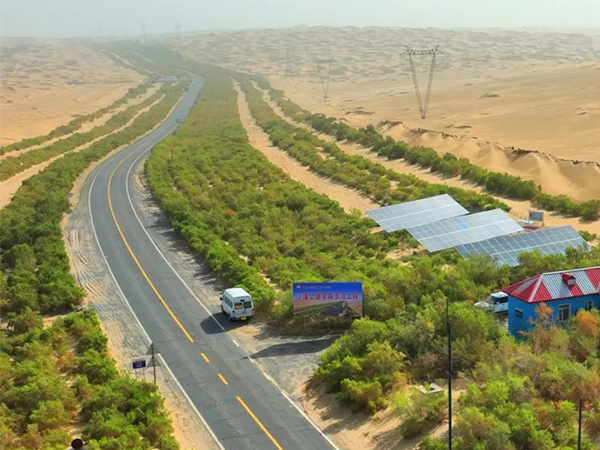Rooted deep in the desert let green and oil dance

A few days ago, the research group composed of the "high-quality development look at energy" activity entered the Tarim Oilfield in Xinjiang, visited the Fuyuan Joint Station of petrochina Fuman Oilfield, the first station of petrochina Tarim Oilfield West-East Gas Transmission and the Tarim zero-carbon Desert Highway.
Tarim Oilfield is the largest ultra-deep oil and gas field in China, the main gas source of west-east gas transmission and the main gas source in southern Xinjiang. It is mainly engaged in oil and gas exploration, development, sales and new energy business in the Tarim Basin. In recent years, Tarim Oilfield continues to advance to the ultra-deep, drilling into China's first 10,000-meter deep well - deep Take 1 well, a total of 151 Wells drilled 8,000 meters deep, found 90% of reserves, 50% of oil and gas production from the ultra-deep, promote China's deep field of science and technology self-reliance, leading China's oil industry to continue to advance deep.
The Fuyuan Combined Station of Tarim Oilfield, located in Shaya County, Aksu Region, Xinjiang, is the core project of capacity construction of Fuman Oilfield, the largest ultra-deep oilfield in China. On November 5, 2023, in Shaya County, Xinjiang, the Fuyuan Joint Station of Tarim Oilfield successfully put into operation, marking the realization of scale economy development of ultra-deep oil and gas 8,000 to 9,000 meters underground in China's largest ultra-deep oil field, Fuman Oilfield, and the completion of the largest crude oil production base in the Taklimakan Desert, which will strongly support the oil field to produce 4 million tons in 2024. The production of 5 million tons at the end of the "14th Five-Year Plan" has played an important role in ensuring national energy security and helping local economic and social high-quality development.
In order to promote the rapid construction of production and a large increase in production, the Tarim Oilfield started the construction of the Fuyuan Joint Station in February 2023, and built a new oil and gas treatment plant with an annual processing capacity of 2 million tons of crude oil and 2 million cubic meters of natural gas per day, and completed more than 220 kilometers of oil and gas transmission pipelines and related auxiliary production devices. The construction of this project will effectively alleviate the problem of overloading of existing oil and gas terminals, promote the doubling of oil and gas processing capacity of Fuman oilfield, and fully release oil and gas production capacity.
Established in September 2004, the first station of West-East Gas Transmission of Tarim Oilfield is located in Luntai County, Bayingoleng Mongolian Autonomous Prefecture, Xinjiang. It is the first station of energy arterial transmission of West-East gas transmission in China and the first station to open the "natural gas era" in China.
The station is mainly responsible for the centralized metering and export of natural gas produced by 28 oil and gas fields in the Tarim oilfield, with an annual gas transmission capacity of 40 billion cubic meters, and undertakes more than 85% of the natural gas export tasks of the oilfield, and is responsible for supplying gas to 400 million people in 15 provinces, regions and cities along the southern Xinjiang and downstream. As of March 4, 2024, a total of more than 350 billion cubic meters of natural gas have been transported downstream, and the solemn commitment of "no short supply, no short supply" has been fulfilled with practical actions.
The Tarim Desert Highway will become China's first zero-carbon desert highway on June 2, 2022. The 86 newly built photovoltaic power stations are distributed in 436 kilometers of ecological protection forest belt, with a total installed capacity of 3540 kilowatts and an annual power generation capacity of 3.62 million KWH. The electricity generated can meet the daily irrigation needs of ecological protection forest, and the ecological protection forest can absorb about 20,000 tons of carbon dioxide every year. The negative carbon part can neutralize carbon emissions from passing vehicles. It was successfully selected as the "Top Ten Super Projects of Central Enterprises" in 2022.
In 1995, the Tarim Oilfield broke through the north-south traffic barrier in the Tarim Basin, and completed the Tarim Desert Highway with a total length of 566 kilometers in the Taklimakan Desert. It has become the longest graded highway running through the mobile desert in the world, and has also become a road driving the economic and social development of southern Xinjiang and benefiting the people of all ethnic groups. In 2003, the desert highway greening project began construction, distributing 108 Wells, using drip irrigation technology, and planting a total of more than 18 million seedlings, known as the world's first "desert green corridor".









 +86-021-67895388
+86-021-67895388 shghfmc@163.com
shghfmc@163.com  93862333
93862333